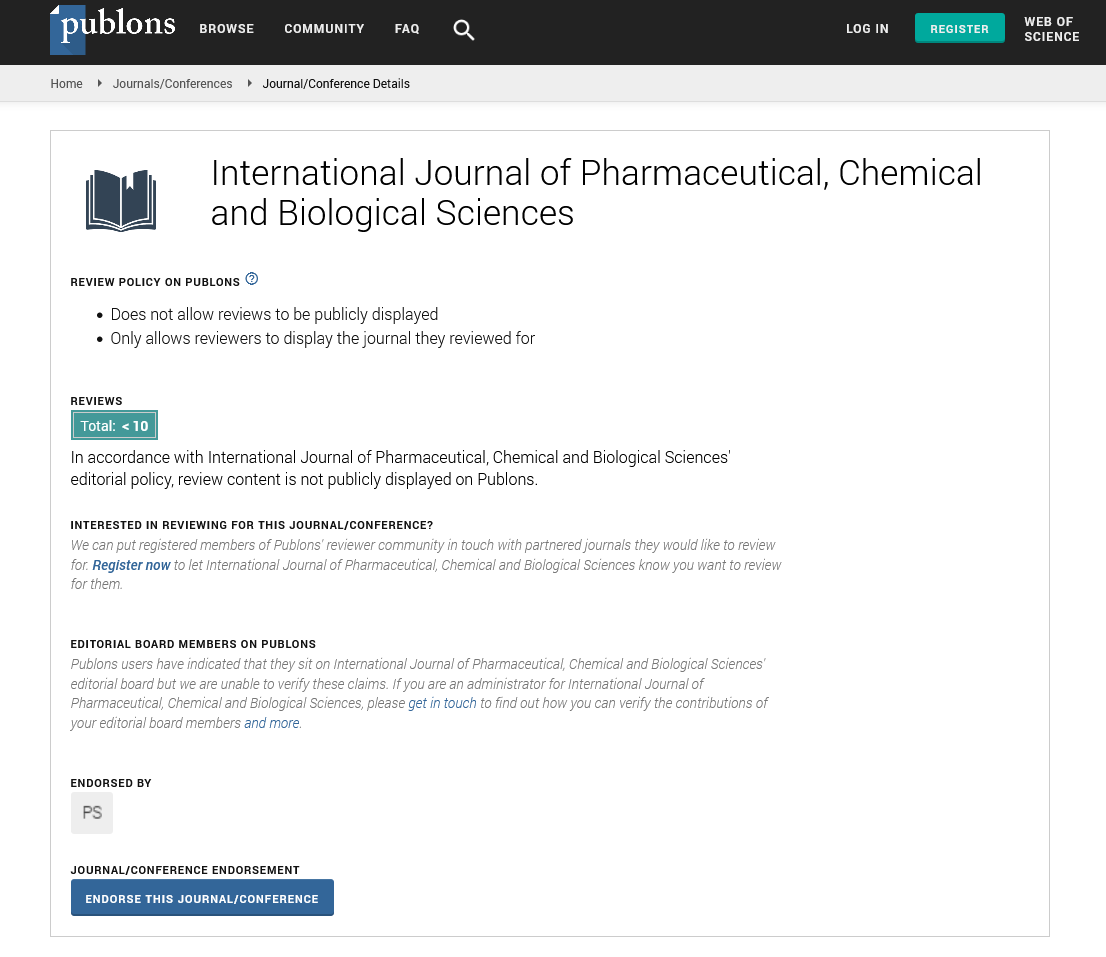Commentary - International Journal of Pharmaceutical, Chemical and Biological Sciences ( 2023) Volume 13, Issue 4
Pharmacognosy: Bridging Traditional Wisdom with Modern Science in Medicine
Sophie Paul*Sophie Paul, Department of Pharmacy, University of London, UK,
Received: 29-Nov-2023, Manuscript No. ijpcbs-23-121822; Editor assigned: 01-Dec-2023, Pre QC No. ijpcbs-23-121822 (PQ); Reviewed: 15-Dec-2023, QC No. ijpcbs-23-121822; Revised: 20-Dec-2023, Manuscript No. ijpcbs-23-121822 (R); Published: 27-Dec-2023, DOI: 10.36648/2471-9668-13.4.8
Abstract
References
Best Betting Sites in China Blog | Real Estate in Australia Blog | Real Estate in Spain Find Lawyer in Illinois Find Lawyer in Colorado Blog | Real Estate in France Info Alt Coins Reverse Mortgage in USA Blog | Real Estate in Japan Blog | Real Estate in Mexico Find Lawyer in Alabama Blog | Real Estate in Russia Car Insurance in Ohio Blog | Real Estate in Thailand Auto Insurance in New York Blog | Real Estate in Turkey Mortgage Calculator Blog | Mortgage Broker in USA Blog | Mortgage Company in USA Mortgage info in WashingtonDescription
Pharmacognosy, a fascinating discipline at the intersection of botany, chemistry, and pharmacology, explores the utilization of natural products-such as plants, microbes, and marine organisms-as sources of medicinal compounds. Rooted in traditional herbal knowledge, pharmacognosy has evolved into a scientific field that investigates the identification, isolation, characterization, and utilization of bioactive compounds for therapeutic purposes. This article aims to delve into the rich tapestry of pharmacognosy, elucidating its historical roots, methodologies, applications in modern medicine, and its potential in shaping the future of healthcare. The origins of pharmacognosy trace back to ancient civilizations where healers, shamans, and traditional medicine practitioners relied on natural remedies derived from plants, minerals, and animals. Ancient texts from cultures worldwide, such as the Indian Ayurveda, Chinese Traditional Medicine, and Greco- Roman medical practices, document the use of plant-based remedies for healing purposes. The development of pharmacognosy as a scientific discipline gained momentum in the 19th and 20th centuries with the isolation and identification of active compounds from plants, such as morphine from opium poppy (Papaver somniferum) and quinine from the cinchona tree (Cinchona species). These discoveries laid the groundwork for modern pharmacognosy, fostering a deeper understanding of natural products’ medicinal properties. Pharmacognosists study plant morphology, taxonomy, and ecology to identify, collect, and authenticate medicinal plants. Ethnobotanical knowledge, fieldwork, and herbarium specimens aid in the systematic documentation of plant sources. Techniques like maceration, distillation, extraction, and chromatography are employed to isolate bioactive compounds from crude plant extracts. These compounds undergo purification to obtain pure substances for further study. Advanced spectroscopic and chromatographic techniques, including mass spectrometry, Nuclear Magnetic Resonance (NMR), and X-ray crystallography, enable the characterization and elucidation of the chemical structures of bioactive molecules. Pharmacological assays and in vitro studies assess the biological activities, pharmacokinetics, and potential therapeutic effects of isolated compounds. This step aids in understanding the mechanisms of action and potential applications in medicine. Natural products serve as a rich source of lead compounds in drug discovery. Many important drugs, including aspirin, paclitaxel, and artemisinin, originate from natural sources and are pivotal in treating various diseases. Traditional medicinal plants and herbal remedies studied in pharmacognosy have contributed to complementary and alternative medicine. Extracts and compounds derived from plants are utilized in the treatment and management of various ailments. Pharmacognosy plays a role in identifying bioactive compounds in foods that offer health benefits beyond basic nutrition. This field contributes to the development of functional foods and nutraceuticals. Natural compounds identified through pharmacognosy are increasingly utilized in skincare and cosmetic products due to their perceived safety and beneficial properties. Pharmacognosy encounters challenges, such as the variability of natural products, limited availability of rare plants, sustainability concerns, and standardization issues related to herbal medicines.
Acknowledgement
None.
Conflict Of Interest
None.

